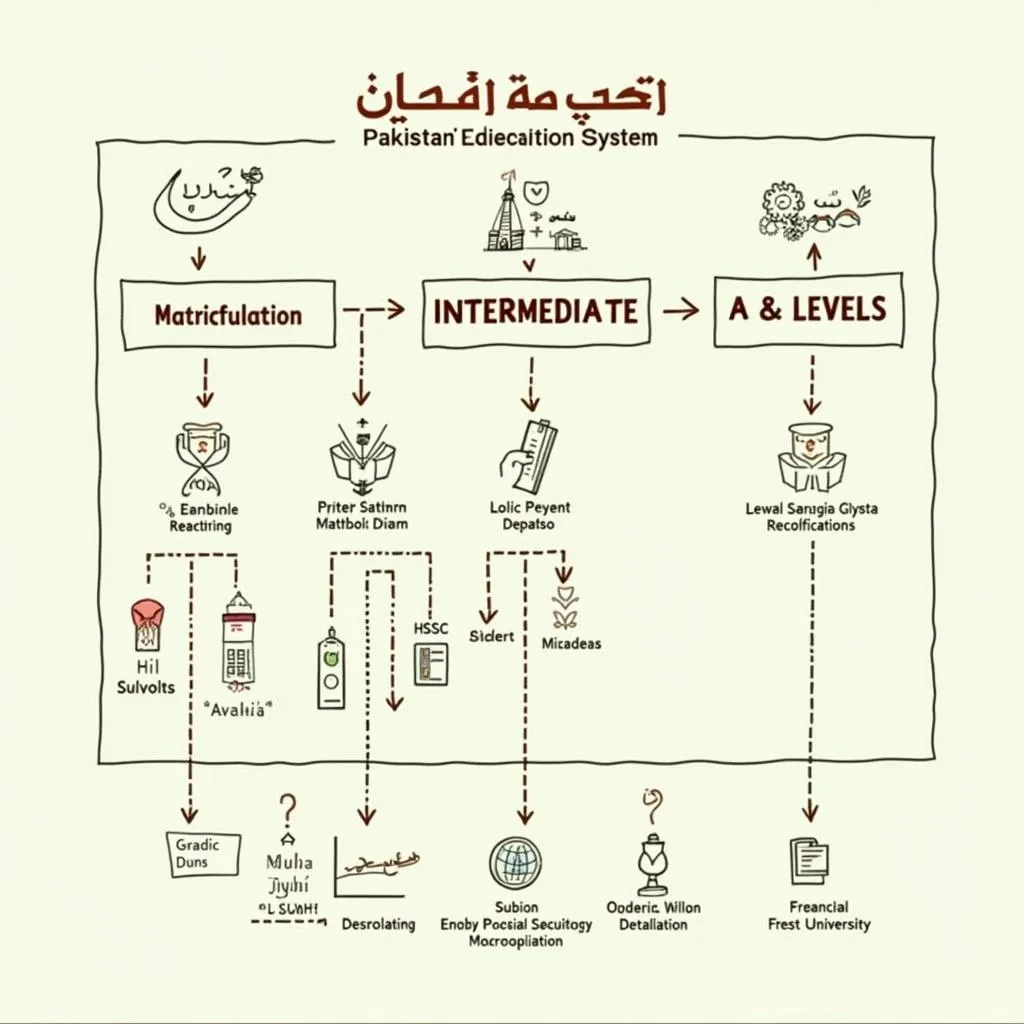Navigating the Pakistani education system can be challenging, especially when comparing it to international standards. If you’re wondering, “What is the A Levels Equivalent In Pakistan?” you’re in the right place. This comprehensive guide will shed light on the different educational pathways and help you understand the Pakistani equivalence of A Levels.
Understanding A Levels
A Levels, short for Advanced Levels, are subject-based qualifications taken by students typically aged 16-18 in the UK and other countries that follow a similar education system. They are considered the gold standard for university admissions in many countries, showcasing a student’s in-depth knowledge and understanding of specific subjects.
The Pakistani Education System
Pakistan follows a different education structure, with a centralized system managed by the boards of Intermediate and Secondary Education. The path after secondary school (matriculation or O Levels equivalent) generally diverges into two main streams: Intermediate (also known as Higher Secondary School Certificate or HSSC) and A Levels.
Intermediate (HSSC): The Pakistani Equivalent to A Levels
While not identical, the Intermediate or HSSC qualification is generally considered the closest equivalent to A Levels in Pakistan. Here’s a closer look at the similarities and differences:
Similarities:
- Post-Secondary Education: Both A Levels and HSSC are pursued after completing secondary education (O Levels or Matriculation).
- Duration: Both typically span two years, with examinations held at the end of each year (AS and A2 for A Levels, and Part 1 and Part 2 for HSSC).
- Focus on Specific Subjects: Students choose 3-4 subjects in both systems, allowing for specialization in areas of interest.
- University Pathway: Successful completion of both qualifications is the standard pathway for university admission in Pakistan and many other countries.
Differences:
- Examining Boards: A Levels are administered by international examination boards like Cambridge Assessment International Education and Edexcel, while HSSC examinations are conducted by regional Boards of Intermediate and Secondary Education within Pakistan.
- Curriculum and Content: While there may be overlaps in some subjects, the curriculum and syllabus for HSSC and A Levels can differ significantly.
- Assessment Methods: A Levels often incorporate a wider range of assessment methods, including coursework, practical exams, and final written exams. HSSC assessments primarily rely on final written exams.
- International Recognition: A Levels generally hold wider international recognition compared to HSSC.
Choosing the Right Path: HSSC or A Levels?
Deciding between HSSC and A Levels depends on your individual circumstances and future aspirations:
HSSC might be suitable if:
- You plan to study at a university in Pakistan.
- You prefer a curriculum tailored to the Pakistani education system.
- Cost-effectiveness is a significant factor in your decision.
A Levels might be suitable if:
- You are considering applying to universities abroad, particularly in countries like the UK, Australia, or Canada.
- You seek a globally recognized qualification.
- You prefer a more internationally aligned curriculum and assessment structure.
Bridging the Gap: Equivalence Certificates
Students who have completed HSSC and wish to apply to universities abroad, where A Levels are the standard requirement, may need to obtain an equivalence certificate. These certificates are issued by organizations like the Inter Board Committee of Chairmen (IBCC) in Pakistan and establish the equivalency of the HSSC qualification to A Levels.
 Pakistan Education System Diagram
Pakistan Education System Diagram
FAQs about A Levels Equivalent in Pakistan
Here are answers to some commonly asked questions:
1. Can I apply to Pakistani universities with A Levels?
Yes, A Levels are widely accepted by Pakistani universities. However, you might need to provide an equivalence certificate from the IBCC.
2. Which subjects should I choose for A Levels if I want to study medicine in Pakistan?
Biology, Chemistry, and either Physics or Mathematics are generally the required subjects for medicine in Pakistan and internationally.
3. Are A Levels more difficult than HSSC?
The difficulty level is subjective and depends on individual learning styles and strengths. Both qualifications demand dedication and hard work.
4. Can I switch from HSSC to A Levels or vice versa after the first year?
While possible, it’s generally not recommended due to significant differences in the curriculum and syllabus.
5. Where can I find more information about A Levels and HSSC in Pakistan?
The British Council Pakistan and the websites of respective examination boards (for A Levels) and the Boards of Intermediate and Secondary Education (for HSSC) are excellent resources.
 Student Choosing Between A Levels and HSSC Books
Student Choosing Between A Levels and HSSC Books
Conclusion
Choosing the right educational pathway is crucial for your future. While A Levels are not directly equivalent to any qualification in Pakistan, the HSSC serves as the closest counterpart. Understanding the nuances of both systems and carefully weighing your options will enable you to make an informed decision that aligns with your academic and career aspirations.
Need assistance navigating your educational journey? Contact us!
- Phone: +923337849799
- Email: news.pakit@gmail.com
- Address: Dera Ghazi Khan Rd, Rakhni, Barkhan, Balochistan, Pakistan
Our dedicated team is available 24/7 to answer your queries and provide guidance.